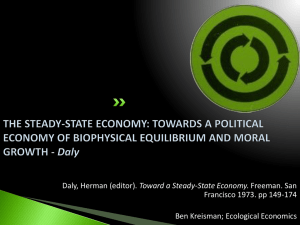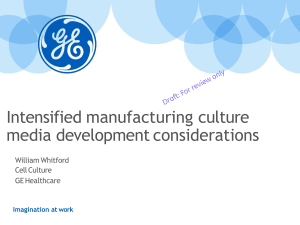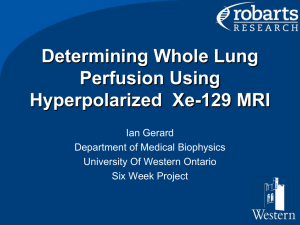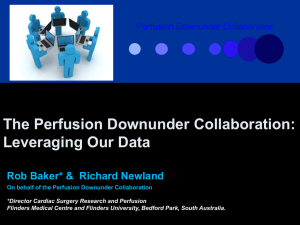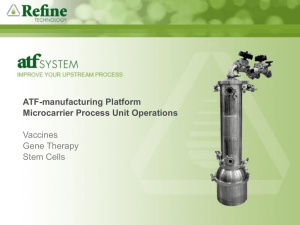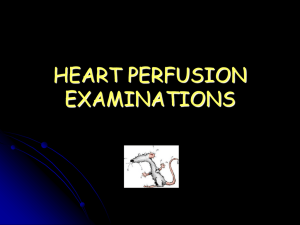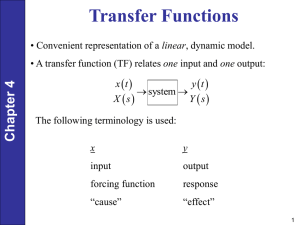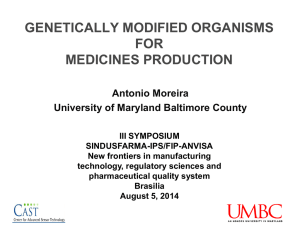Perfusion
advertisement
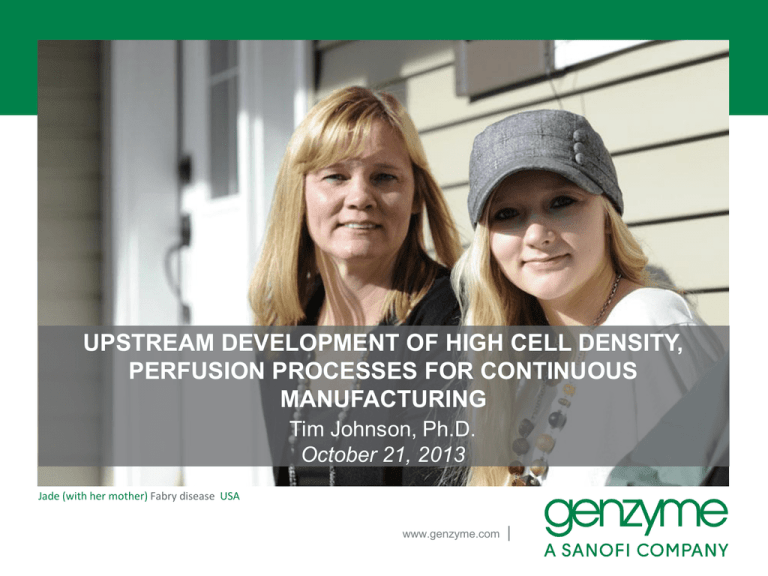
UPSTREAM DEVELOPMENT OF HIGH CELL DENSITY, PERFUSION PROCESSES FOR CONTINUOUS MANUFACTURING Tim Johnson, Ph.D. October 21, 2013 Jade (with her mother) Fabry disease USA www.genzyme.com | Discussion Points • Perspectives on Continuous Manufacturing • Upstream Development − Steady-State Control − Approach to Process Development − Scale-Up • Conclusions Continuous Integrated Biomanufacturing Drivers Predictable Performance Manufacturing, Process, & Business Drivers Efficient Flexible Universal Standardization Reduced Footprint Reduced Tech Transfer Risks Core Drivers Problem Steady State Processes & Product Quality Quality indicator Steady state Variable Variable time Simplicity Current State – Biomanufacturing Processes Limited Standardization, large and complex Media Bioreactor Fed-Batch Perfusion Harvest Hold Clarification Clarified Harvest Capture Intermediate Purification Polish Unform DS Continuous Biomanufacturing Action Steady-State Media Bioreactor Harvest Hold Clarification Clarified Harvest Capture High Cell Density High Productivity Key Technology High Sp. Production Rate Low Perfusion Rate Perfusion Continuous Biomanufacturing Action Steady-State Media Bioreactor Harvest Hold Clarification Clarified Harvest Capture High Cell Density High Productivity Key Technology High Sp. Production Rate Low Perfusion Rate Perfusion Benefit Reduced Bioreactor Size SUBs now feasible Standardized Size Universal – mAbs/Enz Continuous Biomanufacturing Action Media Bioreactor Capture Continuous flow Bioreactor Capture Key Technology Simultaneous Cell Separation and Clarification Perfusion Benefit Removes: • Hold steps • Clarification Ops. Simplified Process Continuous Biomanufacturing Action Media Bioreactor Capture Continuous capture Key Technology Periodic Counter-Current Chromatography Perfusion Benefit Reduced column size and buffer usage Future State – Continuous Biomanufacturing Standard, Universal, Flexible Integrated Continuous Biomanufacturing Predictable Performance Efficient Bioreactor Universal Capture Standardization Reduced Footprint Reduced Tech Transfer Risks Unform. Drug Substance Steady state Steady State Processes & Product Quality Quality indicator Media Flexible Variable Variable time Future State – Continuous Biomanufacturing Standard, Nearly Universal, Flexible Facilitating Aspects Predictable Performance Efficient Flexible Universal Process Knowledge Standardization Reduced Footprint Reduced Tech Transfer Risks PAT & Control Robust Equipment & Design Steady State Processes & Product Quality Quality indicator Steady state Variable Variable time Steady-State Upstream Control Steady-state cell density Steady-state nutrient availability Cell Specific Perfusion Rate = Perfusion Rate Cell Density Steady-state metabolism Steady-state product quality VCD Viable Cell Mass Indicator Cell Density Control Strategies r2 = 0.88 r2 = 0.73 Viable Cell Mass Indicators 12 Capacitance Oxygen sparge Oxygen uptake rate Others r2 = 0.70 Steady-State Upstream Demonstration Steady cell density and growth Steady-state metabolism Volumetric Productivity Steady-state production and product quality CQA #1 CQA #2 CQA #3 Steady-State Product Quality Over 60 days Glycosylation Profiling Peak 1 Peak 7 Peak 4 Peak 8 Peak 5 Peak 11 High Cell Density – High Productivity mAb Demonstration • OPEX drivers for continuous biomanufacturing Vs. fed-batch − High volumetric productivity − Low media cost Productivity VCD Cell-Specific Perfusion Rate − Low perfusion rate Volumetric Productivity (g/L-d) − High cell density OPEX Savings Favorable to Perfusion Viable cell density Outline • Perspectives on Continuous Manufacturing • Upstream Development − Steady-State Control − Approach to Process Development − Scale-Up Process Knowledge • Conclusions PAT & Control Robust Equipment & Design Process Development Design of Experiments • Unrealistic timelines required to study full process (60 days/run) • Leverage steady-state to condense experiments S.S. Perfusion 15 weeks 40 weeks F1 F2 F3 F4 SET 1 SET SET 1 2 SET 3 SET 4 2 SET Fed-batch ~11-15 weeks F1 F2 F3 F4 SET 2 SET 3 SET 4 Measure response shift SET 1 SET 3 SET 4 Process Development Design of Experiments • Approach − Four factors determined from screening studies − Cell Specific Perfusion Rate − pH ATF Exchange Rate − Dissolved Oxygen − ATF Exchange Rate − Custom design with interaction effects 24 conditions Design of Experiments Results • Little interaction effects Viability Rate is the most significant factor Product Quality #1 • Cell Specific Perfusion Growth Rate over the ranges tested SPR • Culture generally stable Cell Specific Perfusion Rate pH DO ATF Exchange Rate Operational Space • Determine acceptable operational space − Fixed cell specific perfusion rate pH ATF Exchange Rate Acceptable Space Dissolved Oxygen Out of Spec Regions Green – Viability Red – Growth rate Blue – Product Quality #1 Integrated Operating Spaces Example Integrating upstream and downstream process knowledge Upstream: Productivity ↓ below critical pH value Downstream: Yield recovery ↓ as pH ↑ Capture Yield Combined Productivity Yield Productivity Reactor Productivity Optimum pH Solution pH Optimal pH exists to maximize productivity and yield Outline • Perspectives on Continuous Manufacturing • Upstream Development − Steady-State Control − Approach to Process Development − Scale-Up Process Knowledge • Conclusions PAT & Control Robust Equipment & Design Scale-up to Single Use Bioreactor • Skid − Custom HyClone 50L Turnkey System − Bioreactor customized for perfusion − Nine control loops • Scale-up approach − Match scale independent parameters SUB − Accounted for scale dependent parameters − Agitation: match bulk P/V • Initial Run − Conservative 40 Mcells/ml set-point − 60+ day operation − 10L satellite running concurrently ATF Scale-up Results Growth and Metabolism Cell Density Oxidative Glucose Metabolism • Growth rate and metabolism are as expected Scale-up Results Productivity Productivity Product Quality #1 • Productivity and product quality are as expected Scale-up Results Continuous Chromatography Integration • Capture operation using three column PCC − Fully automated − Steady-state performance UV Chromatogram SDS PAGE for Capture Elution DS Harvest Day 17 - 35 S.S. Harvest Feed Consistent Capture Duration and Frequency Warikoo, Veena, et al. Integrated continuous production of recombinant therapeutic proteins. Biotech. & Bioeng. v109, 3018-3029; 2012 Godawat, Rahul, et al. Periodic counter-current chromatography – design and operational considerations for integrated and continuous purification of proteins. Biotech. Journal v7, 1496-1508; 2012 Reactor Scale Considerations Productivity Possibilities 50L can meet some low demand products 500L can meet average demand products Further optimization * 500L 50L # * Kelly, Brian. Industrialization of mAb production technology: The bioprocessing industry at a crossroads. mAbs 1:5, 443-452; 2009 Summary and Conclusions Simplicity Core drivers achieved Achieved robust and steady-state control Developed methodology for efficient process understanding Successfully scaled-up upstream process to 50L SUB Platform routinely being applied to mAbs and Enzymes Simplicity and design for manufacturability considerations are a cornerstone of our continuous & integrated platform Additional challenges remain Acknowledgements Genzyme/Sanofi Industrial Affairs Late Stage Process Development Commercial Cell Culture Development Purification Development Process Analytics Early Process Development Analytical Development Translational Research Many other colleagues at Genzyme GE Healthcare
